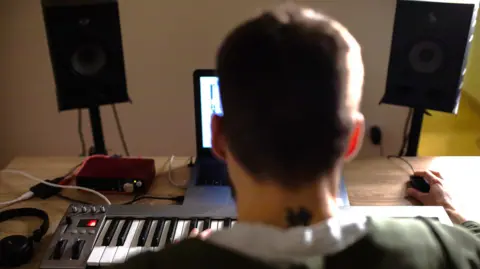 Getty Images
Getty ImagesA musician in the US has been accused of fraudulently streaming songs billions of times using artificial intelligence (AI) tools and thousands of bots to collect millions of dollars in royalties.
Michael Smith, of North Carolina, has been charged with three counts of wire fraud, wire fraud conspiracy and money laundering conspiracy.
Prosecutors say this is the first criminal case of its kind they have handled.
“Through his brazen fraudulent scheme, Smith stole millions in royalties that should have been paid to the musicians, songwriters and other rights holders whose songs were lawfully streamed,” said U.S. Attorney Damian Williams.
According to an unreleased indictment detailing the allegations, the 52-year-old used hundreds of thousands of AI-generated songs to manipulate streams.
These tracks were streamed billions of times across multiple platforms by thousands of automated bot accounts to avoid detection.
Authorities say Mr. Smith claimed more than $10 million in royalty payments during the scheme that spanned several years.
Prosecutors said Mr. Smith would ultimately “face punishment” following their investigation, which also involved the FBI.
“The FBI is committed to rooting out those who misuse advanced technology to obtain illicit profit and exploit the genuine artistic talents of others,” said Acting FBI Assistant Director Christy M. Curtis.
‘Instant Music ;)’
according to indictmentMr Smith was operating over 10,000 active bot accounts to stream his AI-generated tracks.
It is alleged that the tracks in question were provided to Mr Smith through a partnership with the chief executive of an unnamed AI music company, whom he approached around 2018.
The co-conspirator is said to have provided him with thousands of tracks per month in exchange for track metadata, such as song and artist names, as well as a monthly share of streaming revenue.
“Keep in mind what we’re doing here in the music field… it’s not ‘music’ it’s ‘instant music’ ;),” the executive wrote in an email to Mr. Smith in March 2019, and disclosed in the indictment.
Citing emails from Mr. Smith and other participants in the scheme, the indictment also says that the technology used to create the tracks has improved over time — making it harder for platforms to detect the scheme.
In a February email, Mr. Smith claimed that his “existing music has generated over 4 billion streams and $12 million in royalties since 2019.”
If Mr. Smith is convicted of these charges, he could face decades in prison.
Earlier this year, a man in Denmark was sentenced to 18 months in prison after being found guilty of rape. Fraudulently profiting from music streaming royalties,
Music streaming platforms such as Spotify, Apple Music and YouTube generally forbid users from artificially inflating the number of streams to receive royalties, and have taken steps to prohibit this or advise users to avoid this practice.
under Changes to our royalty policies In the order, which took effect in April, Spotify said it would charge a per-track fee if it detected artificial flows in the content of labels and distributors.
It also increased the number of streams required for a track in a 12-month period before royalties are paid, and increased the minimum track length for noise recordings such as white noise tracks.
Wider concerns
The widespread rise of AI-generated music, and the increasing availability of free tools for creating tracks, has raised concerns for artists and record labels about receiving a fair share of the profits earned on AI-created tracks.
Devices that can generate text, images, video, audio in response to signals are based on systems that have been “trained” on vast amounts of data, such as online text and images, often collected indiscriminately from across the web.
Content belonging to artists or protected by copyright has been collected to form part of the training data for such tools.
This has sparked outrage among artists in the creative industries, who believe their work is being used to create seemingly innovative content, without any recognition or reward.
rushed to remove the platform A track that mimics the voices of Drake and The Weeknd It will be released in 2023 once it goes viral and makes its way onto streaming services.
Earlier this year, artists including Billie Eilish, Chapel Roan, Elvis Costello and Aerosmith signed an open letter Calls to end “predatory” use of AI in the music industry,